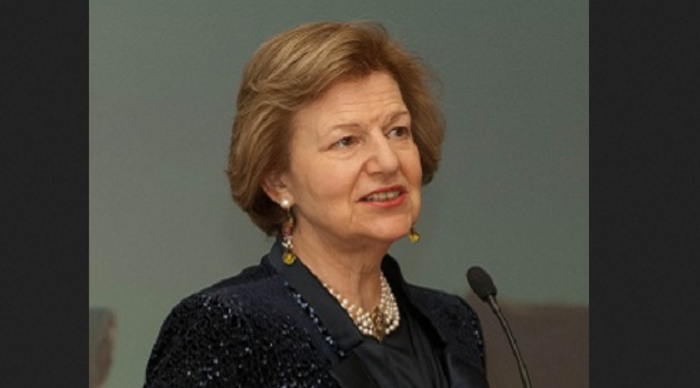Financial Times, February 13, 2018
Stoltenberg says deployment could help ‘win the peace’ as western alliance seeks to meet US demands
Nato’s chief has backed an expanded training force in Iraq as the alliance seeks to meet US demands and juggle growing international commitments in Europe and beyond.
A bigger Nato Iraq deployment could help “win the peace” there, said Jens Stoltenberg, echoing a call from Washington for its allies to take on more responsibility for helping stabilise the conflict-racked country.
The secretary-general made his remarks on the eve of a meeting of Nato defence ministers where Jim Mattis, US defence secretary, is expected to call for “an enduring Nato presence in Iraq”. Some European countries have in the past been wary of deepening involvement in the country — and still draw a line at sending combat troops.
Mr Stoltenberg told reporters that Nato ministers would likely start planning this week for an enhanced training mission in an effort to restore order in Iraq after the defeat of the jihadi group Isis, whose sleeper cells continue to operate. “It is extremely important to stabilise the country after the combat operations have ended,” he said.
He gave no details of the size of the potential Iraq deployment, which would add to a small existing Nato training operation already in Baghdad. He said the increased contingent could focus on areas including the defence ministry and bomb disposal.
Analysts say Nato has been anxious to show its usefulness to the administration of Donald Trump, who as US president-elect declared the alliance “obsolete” and criticised it for not doing more to combat terrorism.
“Nato has been doing more to try to get the Americans back into love with it,” said Nathalie Tocci, director of the Institute of International Affairs think-tank in Rome and also an adviser to Federica Mogherini, EU foreign policy chief.
The move towards a Nato Iraq expansion comes a week after news agencies in the country reported that the US was starting to reduce its troop presence. The US military later acknowledged a “shift in focus” in Iraq, saying it was tailoring its presence to help Iraqi forces maintain their successes against Isis.
Iraqi officials have said that western backers’ forces are still necessary to maintain stability, but the presence of US troops has become a talking point in Iraqi media. Two hardline, Iranian-backed Shia militia forces have threatened to attack if US troops do not withdraw. It is unclear what their stance on the proposed extra Nato forces would be.
The planned Nato Iraq expansion adds to thousands of extra troops posted by alliance members in eastern European member states since Russia annexed Crimea in 2014. The Brussels-based pact also aims to raise its Afghanistan contingent from 13,000 last year to 16,000 in 2018, although the focus will again be on training, with no plans for Nato soldiers to resume combat operations.
No comments yet.
- PAKISTAN STILL NOT CRACKING DOWN ON MILITANTS, US INTEL CHIEF SAYS Asia - Pacific 14.02.2018
- KAZAKHSTAN: GUARANTOR STATES OF ASTANA PROCESS TO MEET IN MARCH Asia - Pacific 14.02.2018
- GERMAN FIRMS’ OPERATION IN AZERBAIJAN’S OCCUPIED LANDS UNACCEPTABLE – MINISTER The Caucasus and Turkish-Armenian Relations 14.02.2018
- US, ALLIES PUSHING TO PLACE PAKISTAN ON TERROR-FINANCING WATCHLIST: REPORT Asia - Pacific 14.02.2018
-
 U.K. PM'S TRADE ENVOY TO VISIT AZERBAIJAN
The Caucasus and Turkish-Armenian Relations
14.02.2018
U.K. PM'S TRADE ENVOY TO VISIT AZERBAIJAN
The Caucasus and Turkish-Armenian Relations
14.02.2018
-
25.01.2016
THE ARMENIAN QUESTION - BASIC KNOWLEDGE AND DOCUMENTATION -
12.06.2024
THE TRUTH WILL OUT -
27.03.2023
RADİKAL ERMENİ UNSURLARCA GERÇEKLEŞTİRİLEN MEZALİMLER VE VANDALİZM -
17.03.2023
PATRIOTISM PERVERTED -
23.02.2023
MEN ARE LIKE THAT -
03.02.2023
BAKÜ-TİFLİS-CEYHAN BORU HATTININ YAŞANAN TARİHİ -
16.12.2022
INTERNATIONAL SCHOLARS ON THE EVENTS OF 1915 -
07.12.2022
FAKE PHOTOS AND THE ARMENIAN PROPAGANDA -
07.12.2022
ERMENİ PROPAGANDASI VE SAHTE RESİMLER -
01.01.2022
A Letter From Japan - Strategically Mum: The Silence of the Armenians -
01.01.2022
Japonya'dan Bir Mektup - Stratejik Suskunluk: Ermenilerin Sessizliği -
03.06.2020
Anastas Mikoyan: Confessions of an Armenian Bolshevik -
08.04.2020
Sovyet Sonrası Ukrayna’da Devlet, Toplum ve Siyaset - Değişen Dinamikler, Dönüşen Kimlikler -
12.06.2018
Ermeni Sorunuyla İlgili İngiliz Belgeleri (1912-1923) - British Documents on Armenian Question (1912-1923) -
02.12.2016
Turkish-Russian Academics: A Historical Study on the Caucasus -
01.07.2016
Gürcistan'daki Müslüman Topluluklar: Azınlık Hakları, Kimlik, Siyaset -
10.03.2016
Armenian Diaspora: Diaspora, State and the Imagination of the Republic of Armenia -
24.01.2016
ERMENİ SORUNU - TEMEL BİLGİ VE BELGELER (2. BASKI)
-
AVİM Conference Hall 24.01.2023
CONFERENCE TITLED “HUNGARY’S PERSPECTIVES ON THE TURKIC WORLD"









